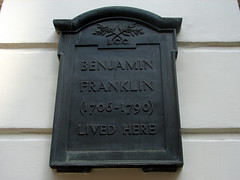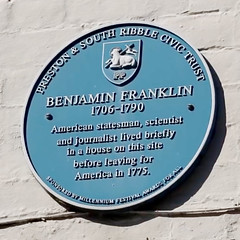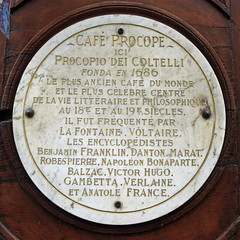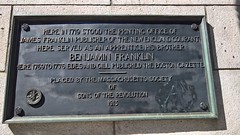Benjamin Franklin


Benjamin Franklin
(1706-1790)
Founding Father of the United States, author, printer, satirist, political theorist, politician, scientist, inventor, statesman, diplomat, and journalist
Family tree
Commemorated on 13 plaques
Benjamin Franklin (1706-1790) lived here
36 Craven Street, Westminster, WC2, London, United Kingdom where they lived
Benjamin Franklin 1706-1790 American statesman, scientist and journalist lived briefly in a house on this site before leaving for America in 1775.
Orchard Street/Friargate, Preston, United Kingdom where they lived
En ce bâtiment Jadis Hôtel d'York le 3 septembre 1783 David Hartley, au nom du Roi d'Angleterre, Benjamin Franklin, John Jay, John Adams, au nom des Etats-Unis d'Amérique, ont signé le Traité Définitif de Paix reconnaissant l'indépendence des Etats-Unis.
English translation: In this building formerly York Hotel on September 3, 1783 David Hartley, on behalf of the King of England, Benjamin Franklin, John Jay, John Adams, on behalf of the United States of America, signed the Final Treaty of Peace recognizing the independence of the United States. [AWS Translate]
56 rue Jacob, Paris, France where they signed the Definitive Treaty of Peace recognizing the independence of the United States (1783)
Fort Allen Well. Only remaining part of Fort Allen, which was built by the Province of Pennsylvania, 1756, under the supervision of Benjamin Franklin. The well, now restored, is located directly behind houses opposite.
Park opposite 112-116 Franklin St., Weissport, PA, United States where they was
Green Tree Inn. In 1753, Benjamin Franklin stayed at inn on this site while he, Richard Peters, and Isaac Norris treated with Indians. Hamilton and Knox, members of Washington's cabinet, lodged here in 1794.
S. Hanover St. between Pomfret & High Sts., Carlisle, PA, United States where they stayed
Benjamin Franklin (1706-1790). Printer, author, inventor, diplomat, philanthropist, statesman, and scientist. The eighteenth century's most illustrious Pennsylvanian built a house in Franklin Court starting in 1763, and here he lived the last five years of his life.
Chestnut St. between 3rd & 4th Sts., at Nat'l. Liberty Mus., Philadelphia, PA, United States where they lived
Pennsylvania Hospital. This is the first hospital in the U.S. Chartered by Colonial Assembly in 1751 for "relief of the sick poor." Benjamin Franklin and Dr. Thomas Bond were its chief founders. First building, erected in 1755, is still used.
Pine St. between 8th & 9th Sts., Philadelphia, PA, United States where they founded
Philadelphia Contributionship, The. for the Insurance of Houses from Loss by Fire ------ Oldest fire insurance company in America. Founded in 1752 by Benjamin Franklin and his friends.
212 S 4th St., Philadelphia, PA, United States where they founded
McAllister Tavern. Here, along the Monocacy Road, Richard McAllister erected a two-story log building and opened a store and tavern. In 1755, Benjamin Franklin was a guest at the Tavern. Old building was razed in 1950.
Baltimore (PA 94) & Middle Sts., Hanover, PA, United States where they stayed
Café Procope. Ici Procopio dei Coltelli fonda en 1686 le plus ancien café du monde et le plus célèbre centre de la vie littéraire et philosophique au 18e et au 19e siècles. Il fut fréquenté par La Fontaine, Voltaire, les Encyclopédistes, Benjamin Franklin, Danton, Marat, Robespierre, Napoléon Bonaparte, Balzac, Victor Hugo, Gambetta, Verlaine et Anatole France.
English translation: Café Procope. Here Procopio dei Coltelli founded in 1686 the oldest café in the world and the most famous center of philosophical and literary life in the 18th and 19th centuries. It was visited by La Fontaine, Voltaire, Les Encyclopédistes, Benjamin Franklin, Danton, Marat, Robespierre, Napoléon Bonaparte, Balzac, Victor Hugo, Gambetta, Verlaine and Anatole France.
13 rue de l'Ancienne Comédie, Paris, France where they visited
Here is 1719 stood the printing office of James Franklin publisher of the New England Courant. Here served as an apprentice his brother Benjamin Franklin. Here 1769 to 1776 Edes and Gill published the Boston Gazette.
Court Street, Boston, MA, United States where they worked
Benjamin Franklin In 1759 the University of St. Andrews awarded an honorary doctor of laws degree to Benjamin Franklin and the city of St. Andrews granted him the freedom of the Burgh. This marker commemorates the conferring of these honors. Marked places by the National Society Daughters of the American Revolution October 2002
75 North Street, St Andrews, United Kingdom where they was (1758)
Lived Here. Benjamin Franklin Printer, philosopher and statesman Born 1706. Died 1790.
Basement of 36 Craven Street, London, United Kingdom where they was (1756-1774)





.jpg?width=250)



